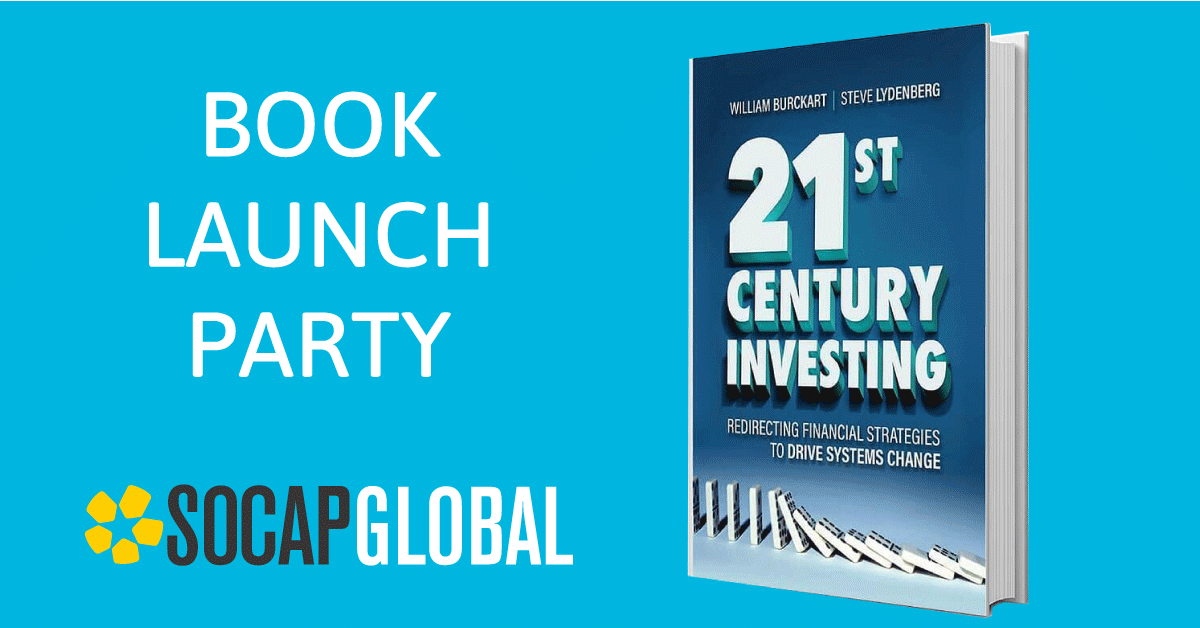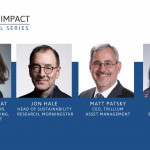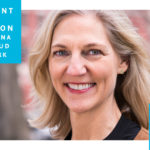“It’s time for a big leap—a really big leap—into the future with a new era of investing,” says Bill Burckart, President of The Investment Integration Project and co-author of 21st Century Investing: Redirecting Financial Strategies to Drive Systems Change. “Doing so is not only what investment should be, but what it must be, if the financial community is to do its part to avoid a multiplicity of collapses and crises that will threaten our complex world in the coming decades, and take advantage of the opportunities that addressing these challenges head on at a fundamental level can generate not only for themselves but for all investors.”
Both authors of 21st Century Investing and another important release, Moving Beyond Modern Portfolio Theory, joined SOCAP, a group of discussants and participants for an interactive book launch party on April 13, 2021, to discuss the examples, lessons, and opportunities for action presented in their new books. Both books seek to push the industry forward into the next frontier in impact investing.
In 21st Century Investing: Redirecting Financial Strategies to Drive Systems Change, authors Bill Burckart and Steve Lydenberg show how institutions and individuals can go beyond conventional and sustainable investing to address complex problems such as income inequality and climate change on a deep, systemic level. In this paradigm-shifting book, Bill and Steve articulate how system-level investors support and enhance the health and stability of the social, financial, and environmental systems on which they depend for long-term returns.
Relatedly, in Moving Beyond Modern Portfolio Theory: Investing That Matters, Jon Lukomnik and Jim Hawley tell the story of how Modern Portfolio Theory (MPT), which revolutionized the investing world and the real economy, is now showing its age. They note that MPT has no mechanism to understand its impacts on the environmental, social and financial systems, nor any tools for investors to mitigate the havoc that systemic risks can wreck on their portfolios. It’s time for MPT to evolve. Jim and Jon propose a new imperative to improve finance’s ability to fulfill its twin main purposes: providing adequate returns to individuals and directing capital to where it is needed in the economy.
“The goal is to redefine what investment is and what its true North Star should be,” shares Jim Hawley, Senior ESG Advisors, Truvalue Labs, A Factset Company. “It is time to reintegrate finance with the broader economy and society.”
An interactive discussion was a large part of the event, including sector-specific commentary from leaders in different impact and investing fields.
Discussant Lisa Davis, Portfolio Manager, U.S. Impact Investing, PGIM Real Estate, shared, “, to date, because we’ve looked at it in the aggregate, we’ve been subject to a market bias to how real estate is impacted by people with high income. … The reality is, if you look at spending across all incomes, and therefore addressing inequality, you see that we have to address things like affordable housing, industrial production, essential retail and essential services if we’re going to have a healthy sector overall. We’re really living through a time where we understand how closely all of these systems are integrated into one another. When people are struggling, in terms of losing jobs or racial inequality, the whole real estate sector suffers, and in fact, the essential parts of the real estate sector, affordable housing and industrial production, are in fact the most stable during times like this. That runs counter to the seeking alpha kind of approach that a lot of traditional real estate investors have focused on.”
Kelly Major Green, Institutional Consultant at Graystone Consulting, added: “We have been operating under the presumption that market risk is not affectable, … and the role of consultants has been to create trade-offs between risk and return and impact on a three-pronged axis. … This might be a new frontier for the consulting business to help shape by client what their actual theory of change is. So, if we have clients who have an interest in gender equality or racial equality, what is the theory of change that they believe in and how does that manifest itself in investing? There is advocacy and other approaches, and historically that has not been the role in the consulting space, not only not the advocate but to release the advocacy toolkit to others.
“… We are being challenged to rethink the connectivity between the capital markets and the economy, and the responsibility of investors with us living in the economy.”
And Renaye Manley, Deputy Director, Strategic Initiatives Department at Service Employees International Union, shared: “Both of these publications provide us with tools to empower our existing argument and framework, and I think it’s important for folks who are used to corporate governance as usual and investing as usual, they need the new context, framework, and data points to help them step out of that box.”
Watch the Full Conversation on The Next Frontier of Impact Investing
Authors:
William (“Bill”) Burckart: President, The Investment Integration Project (TIIP)
Jon Lukomnik: Managing Partner, Sinclair Capital
Jim Hawley: Senior ESG Advisors, Truvalue Labs, A Factset Company
Discussants:
Lisa Davis: Portfolio Manager, U.S. Impact Investing, PGIM Real Estate
Renaye Manley: Deputy Director, Strategic Initiatives Department at Service Employees International Union (SEIU)
Kelly Major Green: Institutional Consultant at Graystone Consulting
Special Remarks:
Steve Piersanti: Founder and Senior Editor, Berrett-Koehler Publishers
Monique Aiken: Managing Director, The Investment Integration Project (TIIP)







